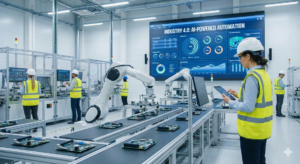How AI Is Powering Smart Homes in 2025

How AI Is Powering Smart Homes in 2025
Just for a moment, try to picture yourself waking up to the soothing sound of your favorite music playing slightly in the background. Whenever the sun rises, your curtains will automatically split, allowing the sunshine to enter. Before you have even gotten out of bed, the coffee machine has already begun preparing your first cup of coffee, and the temperature in the room has been changed to better suit your preferences. No, this is not a scene from a science fiction film. Artificial intelligence is the driving force behind this day-to-day existence in the year 2025.
With the help of artificial intelligence, the idea of “smart homes” has been converted into intelligent living environments. Artificial intelligence is the brain behind the most seamless home experiences we have ever seen. It is responsible for everything from security and comfort to energy efficiency and customized experiences. First, let’s have a look at how everything is coming together.
Individualized Living: Your House Will Acquire Knowledge of Your Routine
Personalization is one of the most striking improvements that has occurred in smart homes in recent times. This means that AI systems are now able to watch your everyday activities, learn from them, and adjust themselves appropriately. You may tell them when you want the lights turned down, when you want the air conditioning turned down, and when you want the music turned on.
Routines for getting up and going to bed are no longer something that you have to actively arrange. Your intelligent house is able to understand trends, such as the time that you typically begin your day, and will prepare itself appropriately. Thanks to the incorporation of artificial intelligence, even your kitchen equipment may provide meal suggestions depending on the contents of your refrigerator and the foods you want to eat.
A More Intelligent Security System That Considers the Future
Cameras and alarms are no longer the only components of home security in the year 2025. Systems that are driven by AI do pattern analysis in real time. They are able to identify recognizable individuals, peculiar behaviors, and unanticipated alterations in the vicinity of your property. In the event that your front door opens at an unusual hour or if someone stays outside for an excessive amount of time, your system will not only warn you; rather, it will assess the degree of danger and has the ability to take necessary steps.
Utilizing artificial intelligence in conjunction with face recognition and behavioral prediction is what makes it even more intelligent. This means that your house is now able to differentiate between members of your family, friends, delivery staff, and possible dangers. Additionally, it acquires the ability to lower the number of false alerts over time.
Voice assistants are becoming more intelligent and more natural.
Can you remember the days when voice assistants would mistake even the most basic of your commands? Not any longer. Conversational, aware of context, and even emotionally sensitive, they have been manufactured using artificial intelligence.
There is no need for you to repeat yourself in the year 2025. Your artificial intelligence assistant is able to comprehend what you mean when you say, “Make it cozy,” and it will alter the lighting, temperature, and background music in accordance with your state of mind or the time of day. You are now able to ask these systems to do multi-step activities more effectively; for example, you may ask them to send a message, organize a meeting, and create reminders all in the same breath.
A Simple Approach to Energy Efficiency
One of the most significant ways in which artificial intelligence is now beneficial to homes is via the use of energy in a more intelligent manner. Your house is able to determine when you are at home and when you are not, after which it will automatically switch off lights, appliances, and change the temperature in order to save energy.
Additionally, it analyzes your energy use and provides recommendations, such as switching to settings that are more energy-efficient, utilizing electrical equipment during off-peak hours, or recognizing gadgets that take more energy than they normally would. Not only does this help you save money, but it also aids in reducing your carbon footprint in a simple manner.
Control that is unified across all devices
The days of having to manage 10 distinct applications for ten different smart devices are long gone. Everything, including lighting, security systems, appliances, entertainment units, and even smart furniture, is now able to function together as a result of the integration of artificial intelligence.
A cohesive environment in which your gadgets can interact with one another is created by artificial intelligence. As an example, when you arrive at your home, your smart door lock may activate the lights in the hallway and activate the thermostat to make the necessary adjustments to the temperature. It is possible for your vacuum to set up a cleaning schedule for when it is aware that you will be off for a stroll.
The Peace of Mind That Comes From Predictive Maintenance
Predictive maintenance is another idea that is picking up steam in smart houses in the year 2025. Using artificial intelligence, it is now possible to identify minor indicators of wear and tear in your appliances before they become major issues. Irrespective of whether it is a water leak, a malfunctioning refrigerator compressor, or a clogged air filter, your home system has the capability to notify you in advance, and in certain cases, it may even automatically schedule a professional.
This type of planning helps to cut down on the expenses of repairs and avoids unexpected failures at the most inopportune periods.
Concerns Regarding Privacy and Safety from an Ethical Perspective
Concerns concerning privacy are warranted considering the increasing role that AI is playing in our everyday lives. With microphones, cameras, and sensors operating around the clock, protecting the privacy of data must be a top concern. As of the year 2025, a significant number of smart home systems include end-to-end encryption, local data processing (which ensures that data does not leave your house), and privacy settings that may be customized.
The most important thing is to choose devices from reputable manufacturers and to have a thorough grasp of the rights you provide to each connected device.
Conclusion: A Smarter Home That Works With You In the year 2025, smart homes driven by artificial intelligence are no longer simply about gadgets; rather, they are about achieving harmony between your lifestyle and technology. In addition to providing you with comfort, convenience, security, and cost savings, they have the ability to adapt to your requirements in a stealthy manner.
In the future, the house of the future will be less about showy technology and more about intelligence that is not apparent to the naked eye as artificial intelligence continues to advance. It is a place that is familiar with you, provides you with assistance, and develops with you, all without requiring continuous involvement.
To put it another way, home is not only the place where the heart is. In the year 2025, this is the place where the intelligent people are.




